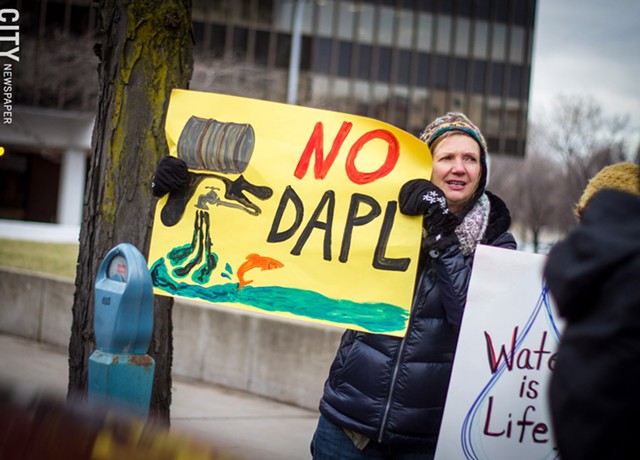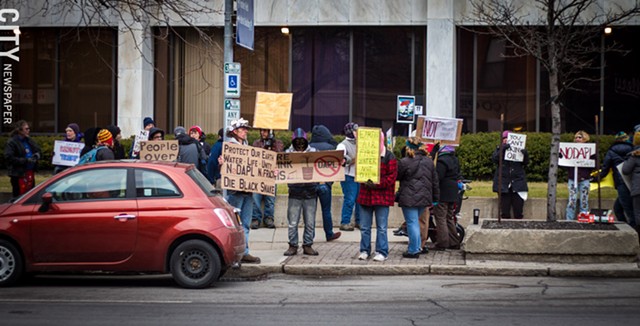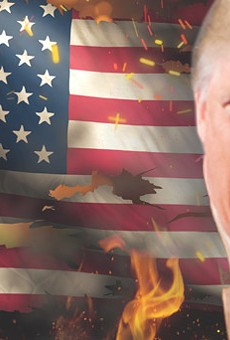President Donald Trump's first week in office was just as bad as we suspected it could be, and probably worse.
The former reality TV personality signed off on a slew of directives targeting Obamacare, immigration, trade agreements, funding for international organizations and agencies, big oil pipelines, and regulations started — but not yet fully implemented — by the Obama administration.

- PHOTO BY KEVIN FULLER
- Protesters gathered in front of the Federal Building on Friday to demonstrate against President Donald Trump’s executive orders on the Keystone XL and Dakota Access pipelines.
Trump and his administration also clamped down on the flow of information — particularly scientific information — from federal agencies and went to war with the facts and the press.
Before the week was over, Politico reported that Trump may order defense and intelligence agencies to reconsider using torture in interrogations. But it also reported that Trump's orders could face legal complications, since they were drafted without the input of relevant departments and, in some cases, appear to run afoul of existing laws.
Trump placed health care right at the core of his Big Ball of Awful. He issued an order that reiterated his commitment to repealing the Patient Protection and Affordable Care Act, which practically everyone calls Obamacare, even though he still hasn't laid out a promised plan to replace it. Congressional Republicans have tossed out a few proposals, but they haven't settled on a plan, either.

- PHOTO BY KEVIN FULLER
- After President Donald Trump signed orders to speed up reviews of the Dakota Access and Keystone XL pipelines, groups across the country organized protests. Friday’s demonstration in front of the Federal Building on State Street was one of them.
The order gives federal agencies broad direction to "waive, defer, grant exemptions from, or delay the implementation of any provision or requirement of the Act" if it'll result in some tax, fee, penalty, or regulatory burden on any person, business, insurer, medical device maker, and so on. But nobody knows what the order really means, including professionals well-versed in the details of health insurance policy.
It's safe to say, anyway, that the order is meant to undermine Obamacare. And it's stoking many Americans' deep concern that they're about to lose their health coverage.
Trump also trained his sights on immigrants. He signed an executive order late in the week that, on the surface, put a halt to all refugees from seven Muslim-majority countries: Syria, Iraq, Iran, Libya, Somalia, Sudan, and Yemen. But because the order was so broad, green card and visa holders from those countries were detained at airports across the country.
A federal judge put a stay on parts of the order, but Trump vowed that his administration would press on. Approximately 500 people gathered at Washington Square Park on Sunday to protest Trump's order and to show that Rochester welcomes refugees.
By the end of last week, Trump had ordered federal agencies to plan, design, and build a wall at the US-Mexico border and proposed a 20 percent tax on imports from Mexico to pay for it. (The federally-recognized Tohono O'odham Nation has sovereign land along 75 miles of the border and vows to block the wall.)
Trump called for hiring 5,000 additional Border Patrol agents and wants to classify state and local law enforcement as immigration officers, which means that they could investigate, apprehend, and detain "aliens," a term that Trump never explicitly defined. The New York Times reports that Trump also wants to resurrect the Secure Communities initiative, where any time local law enforcement books someone on a criminal charge, that person's fingerprint is checked against federal immigration records.
Trump said that the White House will publish a weekly list of crimes committed by immigrants. And he also vowed to strip federal funding from so-called Sanctuary Cities, which he said "willfully violate federal law in an attempt to shield aliens from removal from the United States."
Rochester has been a Sanctuary City since 1986, and Mayor Lovely Warren has submitted legislation to City Council to update the designation, with guidance from State Attorney General Eric Schneiderman.
"Our intention is to protect our citizens while abiding by federal law," Warren said in a statement last week. "In the days ahead the city will work with the Attorney General and the federal government to ensure that, while we remain in full compliance with federal law, city resources won't be used unnecessarily to perform tasks meant solely for immigration enforcement (which federal courts, including the U.S. Supreme Court, have ruled is a federal responsibility and not within the powers of local government)."
The president was perhaps clearest in his orders on the Keystone XL and Dakota Access pipelines, both of which he embraced in his campaign. President Barack Obama rejected Keystone and put the brakes on Dakota Access after protests and resistance from landowners, tribal nations, and environmentalists.
The new president directed federal agencies to expedite any environmental reviews and permits for the projects (and large infrastructure projects in general). He didn't grant them approval, which is an important but perhaps inconsequential distinction considering that his objective is to make it quicker and easier for the pipelines to get through the permitting process.
Activists expected Trump to clear the way for both pipelines, though they were surprised that he made his move so quickly after taking office. Pipeline opponents immediately gathered outside of the White House and Trump Tower in New York City to protest the order.
And local climate action and social justice groups held a protest outside of the federal building on State Street on Friday.
The Standing Rock Sioux have been fighting the Dakota Access pipeline because it runs through ancestral Dakota and Lakota lands and because it would cross the Missouri River, a main source of drinking water for the reservation. The struggle has galvanized activists from across the country, and Standing Rock nation leaders have intensified their campaign to fight the project on procedural grounds.
Following Trump's order, Standing Rock leaders and national environmental groups renewed a call for members of the public to submit comments against the pipeline to the US Army Corps of Engineers, the federal agency conducting an environmental review of the pipeline.
"People should continue to, of course, divest money and think about ways they can switch to sustainable energy," says Lauren Jimerson, a Victor resident and a Seneca who has traveled to stand with the Water Protectors at Standing Rock.
The Trump administration also gagged employees at federal agencies, including scientists at the Environmental Protection Agency, National Parks Service, NASA, and the US Department of Agriculture. Trump hasn't made it clear whether this is a pause until his people take the helm, but the move alarmed agency staff and advocacy groups.
All of those agencies have published important research and data on climate change, which Trump dismisses as a hoax despite overwhelming scientific proof that it's real, that human activity is driving it, and that it's an immediate threat. Trump's cabinet appointees are either dismissive of climate change or hostile toward climate science.
And the administration has started scrubbing mentions of climate change from federal agency websites.
Remember, it was only Trump's first week. He is just getting started.
